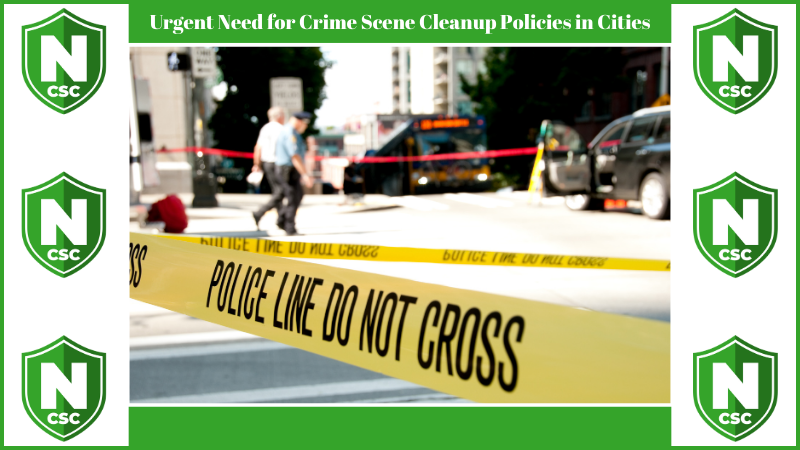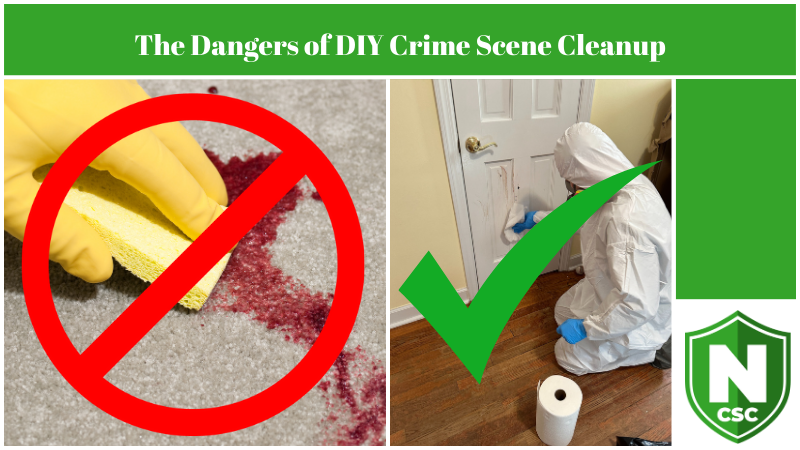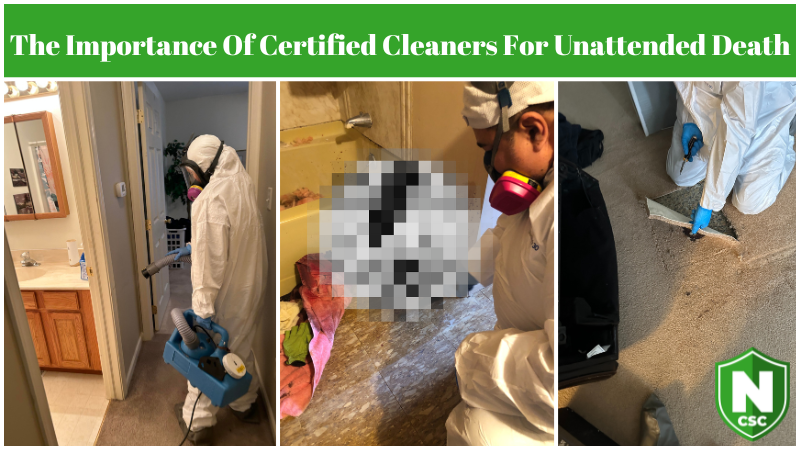Urgent Need for Crime Scene Cleanup Policies in Cities

In cities across the country, the scenes left behind by violent crimes, tragic accidents, and unattended deaths presents a growing concern. Beyond the emotional toll on families and communities, these incidents leave behind hazardous materials that require professional cleaning to ensure public health and safety. Despite this, many municipalities lack comprehensive crime scene cleanup policies, leading to confusion, delays, and potential risks. The urgent need for standardized protocols and regulations for crime scene cleanup is clear—cities must adopt clear guidelines to protect both the environment and their citizens.
In this blog we will cover the role crime scene cleaning plays in society and the consequences of neglecting this important service.
The Importance of Crime Scene Cleanup
The importance of crime scene cleanup cannot be overstated, as it directly impacts the health and safety of individuals involved in or near a traumatic event. Crime scenes often involve biohazard materials that pose significant health risks, including bloodborne pathogens and other contaminants. These materials can harbor dangerous bacteria and viruses, which makes professional biohazard cleanup essential to mitigate contamination dangers.
By entrusting this delicate task to trained professionals, you ensure that the area is thoroughly sanitized and restored to a safe condition. Our experts at National Crime Scene Cleanup understand the complexities involved and are equipped with the necessary tools and knowledge to mitigate any risks effectively. Don’t underestimate the importance of professional intervention; it safeguards not only physical health but also offers peace of mind during an incredibly challenging time.
Current Crime Scene Cleanup Policies: What Do They Look Like Across Major Cities?
Current crime scene cleanup policies vary significantly across major cities, reflecting the unique challenges and priorities of each municipality. These city regulations are designed to ensure public safety while managing the sensitive nature of crime scene management. In many urban areas, municipal guidelines mandate that professional cleanup services be employed following a violent incident.
In cities like New York and Los Angeles, comprehensive crime scene policies are established that dictate how law enforcement collaborates with specialized cleanup crews. These regulations ensure that hazardous materials are handled properly, minimizing health risks associated with biohazards. For instance, many municipalities require certified professionals for crime scene management, ensuring that only trained individuals engage in the sensitive task of cleanup.
Moreover, city regulations often stipulate timelines for cleanup operations to prevent prolonged exposure to traumatic sites. This is not just about restoring physical spaces; it’s also about addressing the psychological impact on communities affected by violence or tragedy. By establishing clear protocols and holding companies accountable through licensing requirements, cities can enhance their overall response strategies during critical incidents.
As we continue to navigate complex urban environments, understanding these crime scene policies is crucial for both residents and professionals involved in emergency response efforts.
Challenges Facing Crime Scene Cleanup Efforts in Urban Areas
Urban crime scenes present a unique set of challenges that complicate cleanup efforts, making them a critical issue for public safety and health. Here are some of the challenges:
- Resource Allocation: In densely populated areas, the demand for cleanup services often exceeds available resources, leading to delays that can compromise both safety and public health.
- Legal Hurdles: Urban environments frequently involve intricate legal hurdles that complicate the cleanup process. Navigating local laws and regulations can slow down response times and create additional obstacles for cleanup teams trying to restore safety to affected areas.
- Crime in Public Areas: In many case when a crime happens inside a building insurance policies can cover the cost of cleanup but what happens when a crime takes place on the street? In cities that don’t have proper policies this leaves public areas as biohazard risks.
As urban areas continue to grapple with rising crime rates, addressing these cleanup challenges must become a priority. By advocating for better resource allocation, streamlining legal processes and having a plan to cover cleanup jobs in public areas we can ensure that our cities remain safe and clean, ultimately protecting public health and restoring communities more effectively after tragic events.
Examples of Cities that Lack Proper Crime Scene Cleanup Policies
Atlanta
According to an article from Atlanta News First, the city had a contract with clean-up crews which expired and went unnoticed for over a year. This has resulted in crimes scenes being left uncleaned for weeks raising concerns over safety from the local community. Larkeena Brek, who owns a business across the street from where a violent crime had taken place was surprised to learn that crime scenes are not being properly cleaned.
“It’s sad for your loved ones who have to walk around and see that and keep playing that picture over and over. That’s crazy,” Brek said. “I wasn’t aware all of that was going on until now. Hopefully things get improved so we can all feel safe.”
Like we discussed earlier, this particular crime happened in a public area so the responsibility of the cleanup is on the city. From this example you can see how this mismanagement has put common citizens in harms way and forced many to relive the trauma of what had occerd. Atlanta city leaders are working to hire a crime scene cleanup vendor to tackle this issue.
Philadelphia
Philadelphia just like many other cities has seen a high rate of gun violence over the past few years. Although the violence had significantly dropped in 2024 there is still a lingering problem with providing adequate cleanup. Adam Geer, the City of Philadelphia’s Chief Public Safety Director launched a crime scene cleanup program after hearing about a specific incident.
“Someone made a complaint that after this horrible murder that occurred on the sidewalks in Philadelphia, that the grandma was out there the next day with her neighbors, with literally water and bleach and buckets, trying to clean up the aftermath,” Geer said. “We were horrified, frankly, that our citizens were doing this work.”
Under this new program, police officers arriving at a crime scene will wait until the detective on site releases the scene and calls the dispatch center to request a cleanup. Dispatchers will call the cleanup vendor who must show up within 90 minutes as per the contract.
How to Advocate for Better Crime Scene Cleanup Policies in Your City
To effectively push for change, you need to employ robust community engagement strategies that resonate with local residents and officials alike. Here is what you can do:
- Raise Awareness Of The Problem: Start by raising awareness about cleanup issues within your community. Organize informational sessions or workshops that highlight the importance of timely and thorough crime scene cleanups. Use social media platforms to share stories, statistics, and the emotional toll on families affected by violent crimes. By creating a narrative around these issues, you can foster empathy and motivate others to join your cause.
- Lobbying For Change: Connect with local government initiatives aimed at public safety and health. Attend city council meetings to voice your concerns directly to decision-makers. Present evidence of how other cities have successfully improved their policies, showcasing the benefits of thorough cleanups not only for affected families but also for community well-being
- Launch A Petition: This grassroots movement will amplify your voice and demonstrate to local government that there is a collective demand for action.
By actively engaging with both the community and local government, you can create a powerful coalition advocating for change. Together, let’s work towards ensuring that our cities are not only safe but also compassionate spaces where victims receive the respect they deserve during their most challenging times.
Taking Action Now to Ensure Safer Communities Through Improved Cleanup Policies
In the wake of crime and tragedy, the importance of swift and professional cleanup cannot be overstated. As cities grow and incidents rise, the absence of clear crime scene cleanup policies leaves both residents and first responders vulnerable to health risks. Implementing standardized regulations will not only streamline cleanup processes but also protect public health, restore peace of mind, and prevent further trauma for those affected. It is time for cities to take proactive steps, ensuring that when tragedy strikes, they are prepared with the necessary measures to safeguard their communities.
If you are in urgent need of cleanup call us at 1-844-977-5075 and one of our reps will be able to help you ASAP.



